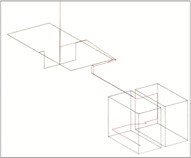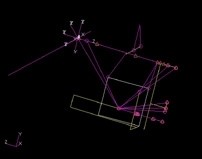Colleagues:
Optics is an art that’s just meant to work… until it doesn’t.
The optomechanical engineer’s job is to survey the available mechanical design
spaces looking for optical problems. The engineer identifies the problems
early, gets on top of them and stays on top all the way through. MSC Software Corporation recently published a Case Study on this
subject. Here’s the link—
Optomechanics
at MSC
Many problems can be anticipated and avoided by using relatively
simple, lumped-parameter models in the beginning of a project. If the
project waits until the distributed properties are well defined it may be too
late and the budget and schedule considerations may even shut the project
down. Optomechanical analysis is at least an order of magnitude trickier
than the individual disciplines alone. So the engineer has to have tools,
and that means being able to couple the structure to the optical behavior in a
single code. AEH uses MSC/Nastran
and AEH/Ivory.
Here are two examples, one a success the other a failure. Both
were gimbal-stabilized telescopes of roughly the same size:


The failure was a project that would not let the
lumped parameter LOS model be run in the beginning but insisted that the
analysis model be prepared from the finished engineering drawings. The
full-up analysis showed an unstable LOS. Redesigned solutions were
possible but costly. This project was cancelled.
The successful project was able to demonstrate sufficient margin of safety with
the lumped parameter LOS model that a full-up optomechanical model
wasn’t needed. The structural engineers could concentrate on strength and
safety. This project was fielded.
Neither outcome was intuitive or obvious at the projects’ beginnings but their
results couldn’t have been more stark.
Powerful tools, simple models, early in the project: The eye-candy may be
poor but the numbers can save the engineer’s buttons.
Spring is lovely in Pasadena. I hope
you’re enjoying it as much as I am.
Al H.
5-14-15
